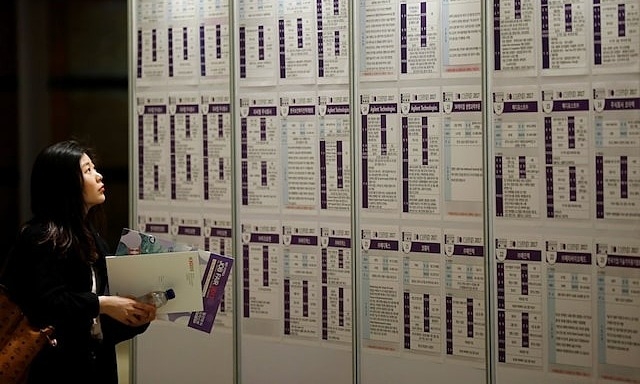Edition: International | Vietnamese
© Copyright 1997 VnExpress.net. All rights reserved.

Hired by a restaurant owner who promised to pay her on the first Tuesday of each month, the 23-year-old worked diligently for KRW 10,500 (US$7.6) per hour. But after three months her wages suddenly stopped.
"My boss withheld my wages and accused me of violating the restaurant's rules though nothing was said clearly in the contract," she tells VnExpress International.
Despite her repeated requests, he refused to pay and threatened to report her to her school. After months of delay he added a new demand: he would pay only if she submitted her ID for tax returns, a requirement she knew did not apply to her minimum wage.
With encouragement from her school and legal counsel, Tra filed a complaint with the Ministry of Employment and Labor. Under the threat of a fine of KRW7 million, her employer agreed to pay part of her wages.
But the incident has left Tra traumatized and hesitatant about looking for a job. "It was such a stressful experience. All I could feel was exhaustion, even after I reclaimed my money."
It is a story foreign workers in South Korea are becoming increasingly familiar with.
The country is dealing with record levels of wage arrears this year, with foreign workers significantly affected.
In the first seven months alone unpaid wages to foreign workers were worth nearly 70 billion won ($50.4 million), Korea Bizwire reported.
Data from the Ministry of Employment and Labor obtained by lawmaker Kim Wi-sang of the People Power Party shows that 14,913 foreigners working for 4,124 businesses did not receive their full pay in the period.
In the last five years foreign workers had unpaid wages of 120 billion won annually. Small businesses are the main culprits, with 90% of unpaid wages bring by companies with fewer than 30 employees.
Kim underlined the gravity of the situation, saying: "Wage arrears are a serious crime against people’s livelihoods that ruins workers’ lives. Foreign workers should be protected by the same standards as domestic workers."
For nearly three years Nepalese Hari Shrestha, 33, worked 12-hour shifts for six days a week at a small textile factory for a monthly salary of bout $2,350, which he did not get regularly, according to the New York Times.
"They have never paid me in time or in full," he says, showing an agreement his former employer signed with him promising to pay part of his overdue wages.
One of the primary reasons for employers cheating expatriate workers is their inability to change jobs except under certain circumstances.
Even in case of unpaid wages or safety violations, workers are often unable to leave unless their employers agree to release them from their contracts. If they cannot obtain official approval to change jobs, they become undocumented aliens.
"We've seen cases of employers not paying their workers and threatening to report them for desertion and have them deported," Choi Jeong-gyu, an attorney at law firm Wongok, has been quoted as saying by Hankyoreh. "These employers also lie to their workers by saying if they do not report the overdue payments they will help them get back into the country by recommending them as loyal employees."
A survey by the National Human Rights Commission of Korea early this year found nearly 80% of respondents saying they had filed complaints with relevant agencies about unpaid wages but experienced difficulty due to the language barrier and a lack of understanding of labor laws. The survey polled 379 expatriate workers.
The commission suggested solutions to the problem of overdue wages like increasing the number of help centers for foreign workers and punishing employers who do not pay wages.
The Labor Standards Act stipulates three years’ imprisonment or fines of up to 30 million won for employers who fail to pay wages in time. But cases rarely reach the courts, and the average fine imposed is only around two million won.
Even if workers report unpaid wages to the Ministry of Employment and Labor, the process of verification and resolution can take months. The average period it takes to resolve such violations is four years and 10 months.
"The Labor Ministry needs to amend regulations so that foreign workers can change jobs if their employer refuses to pay their wages," Choi says. "This will enable them to earn money elsewhere while avoiding additional suffering under the abusive employer."
Former Minister of Employment and Labor Lee Jung-sik and Minister of Justice Han Dong-hoon said getting their salary paid in time is a basic right of employees. They pledged to crack down on "malicious" employers with tough measures like detention even during the investigation.
But the lure of higher incomes in the country means more than 300,000 low-skilled workers are in the country on temporary work visas.
Sammer Chhetri, 30, arrived in South Korea in 2022 and sends $1,500 of his $1,750 monthly paycheck to his family in Nepal. Chhetri, who works from dawn to dusk in long, tunnel-shaped greenhouses, says: "You can’t make this kind of money in Nepal."
Another Nepalese worker, Hari Shrestha, 33, says his earnings from a South Korean furniture factory have helped his family build a house back home.
For other young people like Tra the benefits of working in South Korea outweigh the problems.
"I still want to work in South Korea after my graduation," she says. "The salary is better, and there will be more chances to develop my career."